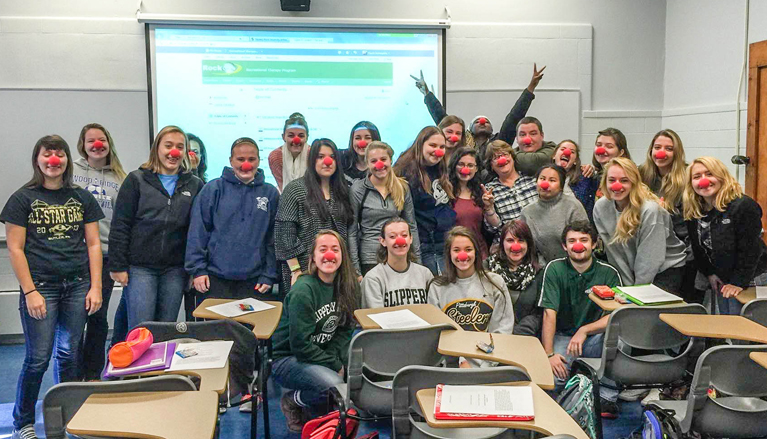SRU recreational therapy professors receive grant

Colleen Cooke, SRU professor of recreational therapy, introduced a lecture on the value of humor therapy by providing clown noses to each of her students. Cooke is one of three recreational therapy professors to receive professional development grant funds.
Jan. 14, 2016
SLIPPERY ROCK, Pa. - Experts agree that chronic stress, without relief, can contribute to both physical and mental health issues such as a suppressed immune system, cardiovascular disease, musculoskeletal disorders, cancer, diabetes, depression and anxiety.
According to the American Psychological Association, 33 percent of Americans experience extreme stress, and more than 73 percent report some physical or psychological symptoms.
For employers, stress induced health issues can mean more than $300 billion in missed work and healthcare costs for individuals who already have a chronic illness, or care for someone with a chronic condition.
Recreational therapists, along with other health professionals, are helping to address chronic stress issues through specific evidence-based interventions such as animal-assisted therapy, therapeutic humor and HeartMath.
One common finding is the need for highly trained professionals to facilitate the interventions.
To that end, a trio of Slippery Rock University recreational therapy professors, Colleen Cooke, Deborah Hutchins and Betsy Kemeny, have received a faculty professional development grant from Pennsylvania's State System of Higher Education to pursue certification in therapeutic humor, animal-assisted and HeartMath therapies, respectively.
The Commission on Accreditation of Allied Health Education Programs accredits the recreational therapy program at SRU, through recommendation of the Committee on Accreditation of Recreational Therapy Education. A new focus area in CARTE's established guidelines requires the teaching of a minimum of three specific modalities to provide students with an opportunity to gain transferable skills.
"In order for each of us to pursue more in depth teaching of these modalities, and thereby provide our students with a richer learning experience and how these areas can be used as intervention tools with clients," said Hutchins, "furthering our own educations was a necessity."
Therapeutic humor includes any intervention that promotes health and wellness by stimulating a "playful discovery, expression or appreciation of the absurdity of life's situation," according to the Association of Applied and Therapeutic Humor.
"This area can be so easily incorporated into anyone's lifestyle," said Cooke. "No one feels bad when they are laughing, and being playful is inherent in each of us since birth...and play leads to laughter."
"I take that approach with my students now and they love it," Cooke said. "Whether its through jokes or movie clips or tongue twisters, I've found that by introducing a playful approach in the classroom, they learn more when they are having fun with the material."
"That puts them in a better frame of mind to retain what I'm teaching and thereby pass it along to their clients as a viable intervention tool."
Additionally, according to Cooke, humor therapy can be used as a complementary treatment to aid in healing or coping, whether physical, emotional, cognitive, social or spiritual.
Animal-Assisted Therapy is a goal-directed intervention delivered by a professional with specialized expertise to utilize animals to promote human improvements in physical, social, emotional and/or cognitive function. According to Hutchins, research supports the use of AAT to reduce stress and trauma recovery, promote emotional well being and reduce behavioral problems, anxiety or loneliness and reduce anxiety and pain associated with surgery. Individuals with mental illness have shown improvements in self-awareness and enhanced trust.
For the past few years, Hutchins has brought her dogs, Bella and Sookie, to SRU to visit with students during exam week.
"During those intense study periods, it is important to take a mental health break," Hutchins said. "If students can clear their minds and crack a smile, it may allow them to think more clearly. Interaction with pets has been shown to decrease the level of cortisol (stress hormone) in people. Therefore, there is an emotional, physical and social aspect to this intervention."
Kemeny's area of focus, HeartMath, involves a set of techniques to help people handle stress and negative emotions "in the moment," while improving performance and quality of life.
"It's much more than deep breathing or mental imagery," Kemeny added, "When I first heard about it, I was a bit skeptical myself, but there are 20-plus years of research behind it. The real benefit is that it offers self-management techniques that allow individuals to gain greater control of their mental and emotional stress."
HeartMath techniques have been shown to be effective in reducing stress and depression in individuals with congestive heart failure, HIV-AIDS, diabetes and those with brain injuries. The application of HeartMath has also been used successfully for college students with performance or test anxiety.
Kemeny is being trained in two aspects of the program, HeartMath Mentor Certification, which she has already earned, and HeartMath Clinician Certification.
The mentor certification is designed to help clients bring their physical, mental and emotional systems into balanced alignment with their heart's intuitive guidance, while clinician certification provides self-regulation techniques, protocols and technologies for sustainable perceptual, attitudinal and behavioral changes.
Kemeny will need both certifications in order to demonstrate HeartMath during service learning programs and also provide in-depth teaching to students.
While each professor continues training through the summer, integration of the new materials into the classroom has already begun.
"Once the training is completed," Hutchins said, "we will be developing more comprehensive approaches to enhancing student learning in these areas. The ultimate goal is to prepare students to manage stress, both personally and professionally with clients, in order to enhance overall health and promote well-being."
MEDIA CONTACT: Robb King | 724.738.2199 | robert.king@sru.edu

